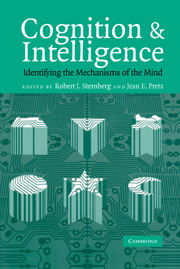Book contents
- Frontmatter
- Contents
- Preface
- 1 Information Processing and Intelligence: Where We Are and Where We Are Going
- 2 Mental Chronometry and the Unification of Differential Psychology
- 3 Reductionism versus Charting: Ways of Examining the Role of Lower-Order Cognitive Processes in Intelligence
- 4 Basic Information Processing and the Psychophysiology of Intelligence
- 5 The Neural Bases of Intelligence: A Perspective Based on Functional Neuroimaging
- 6 The Role of Working Memory in Higher-Level Cognition: Domain-Specific versus Domain-General Perspectives
- 7 Higher-Order Cognition and Intelligence
- 8 Ability Determinants of Individual Differences in Skilled Performance
- 9 Complex Problem Solving and Intelligence: Empirical Relation and Causal Direction
- 10 Intelligence as Smart Heuristics
- 11 The Role of Transferable Knowledge in Intelligence
- 12 Reasoning Abilities
- 13 Measuring Human Intelligence with Artificial Intelligence: Adaptive Item Generation
- 14 Marrying Intelligence and Cognition: A Developmental View
- 15 From Description to Explanation in Cognitive Aging
- 16 Unifying the Field: Cognition and Intelligence
- Author Index
- Subject Index
- References
15 - From Description to Explanation in Cognitive Aging
Published online by Cambridge University Press: 23 November 2009
- Frontmatter
- Contents
- Preface
- 1 Information Processing and Intelligence: Where We Are and Where We Are Going
- 2 Mental Chronometry and the Unification of Differential Psychology
- 3 Reductionism versus Charting: Ways of Examining the Role of Lower-Order Cognitive Processes in Intelligence
- 4 Basic Information Processing and the Psychophysiology of Intelligence
- 5 The Neural Bases of Intelligence: A Perspective Based on Functional Neuroimaging
- 6 The Role of Working Memory in Higher-Level Cognition: Domain-Specific versus Domain-General Perspectives
- 7 Higher-Order Cognition and Intelligence
- 8 Ability Determinants of Individual Differences in Skilled Performance
- 9 Complex Problem Solving and Intelligence: Empirical Relation and Causal Direction
- 10 Intelligence as Smart Heuristics
- 11 The Role of Transferable Knowledge in Intelligence
- 12 Reasoning Abilities
- 13 Measuring Human Intelligence with Artificial Intelligence: Adaptive Item Generation
- 14 Marrying Intelligence and Cognition: A Developmental View
- 15 From Description to Explanation in Cognitive Aging
- 16 Unifying the Field: Cognition and Intelligence
- Author Index
- Subject Index
- References
Summary
Two different approaches have been employed in contemporary research to investigate the effects of aging on cognitive and intellectual abilities. One approach can be termed process analysis because it relies on task analyses or formal models to attempt to identify the specific processes in a cognitive task that are responsible for the observed age differences. This approach has used a variety of analytical methods such as subtraction, additive factors, and process dissociation to attempt to partition the variance in the target variable into theoretically distinct processes. Because the primary interest is in decomposing the variance in a single variable into different processes, process analysis research has typically involved comparing performance in one or more conditions in a single task, frequently in relatively small samples of young and old adults.
The second approach taken to investigate aging and cognition can be termed covariance analysis because it attempts to specify which combinations of variables covary together with respect to their age-related influences. A primary goal of this type of research is to partition the variance in the target variable into a portion not related to age, a portion related to age and shared with other variables, and a portion uniquely related to age. Covariance analysis research necessarily requires data from multiple variables and tasks and usually involves moderately large samples of adults across a wide age range.
One way to conceptualize the difference between the two perspectives is portrayed in Figure 1.
Information
- Type
- Chapter
- Information
- Cognition and IntelligenceIdentifying the Mechanisms of the Mind, pp. 288 - 305Publisher: Cambridge University PressPrint publication year: 2004
References
Accessibility standard: Unknown
Why this information is here
This section outlines the accessibility features of this content - including support for screen readers, full keyboard navigation and high-contrast display options. This may not be relevant for you.Accessibility Information
- 1
- Cited by
